
KRYVYI RIG, UKRAINE, AUGUST 2011: A young man in the final stages of full blown Aids lies in a coma days from death in hospital, Kryvyi Rig, Ukraine, 31 August 2011. He has a very low T cell count and is almost certain to die from immune failure related disease. The reason his case is so dire is because there have been no new admissions allowed to the list of Anti Retro-Viral therapy recipients for those people living with full blown Aids in Ukraine since the end of 2010. Nine months later in September 2011 all those people who have become critically ill but are not on the old list of ART recipients are living under a death sentence as their immune systems collapse. There is a new Government in Ukraine and the Ministry of Health controls all ART (Anti-RetroViral treatment,) medicine. As this business is put out to tender to the various pharmaceutical companies, a series of ignorances, bribes and corrupt practises hinder this vital service from coming into being in time to provide life-saving ART therapy to those who are dying without it. (Photo by Brent Stirton/Reportage for Getty Images.)

KRYVYI RIG, UKRAINE, AUGUST 2011: A very sick man living with full blown Aids holds up his young son while his wife looks on, Kryvyi Rig, Ukraine, 31 August 2011. This man has a very low T cell count and is almost certain to die soon. He recently married his girlfriend and the mother of his child to ensure she will inherit his possesions when he dies. The reason his case is so dire is because there have been no new admissions allowed to the list of Anti Retro-Viral therapy recipients for those people living with full blown Aids in Ukraine since the end of 2010. Nine months later in September 2011 all those people who have become critically ill but are not on the old list of ART recipients are living under a death sentence as their immune systems collapse. There is a new Government in Ukraine and the Ministry of Health controls all ART (Anti-RetroViral treatment,) medicine. As this business is put out to tender to the various pharmaceutical companies, a series of ignorances, bribes and corrupt practises hinder this vital service from coming into being in time to provide life-saving ART therapy to those who are dying without it. (Photo by Brent Stirton/Reportage for Getty Images.)
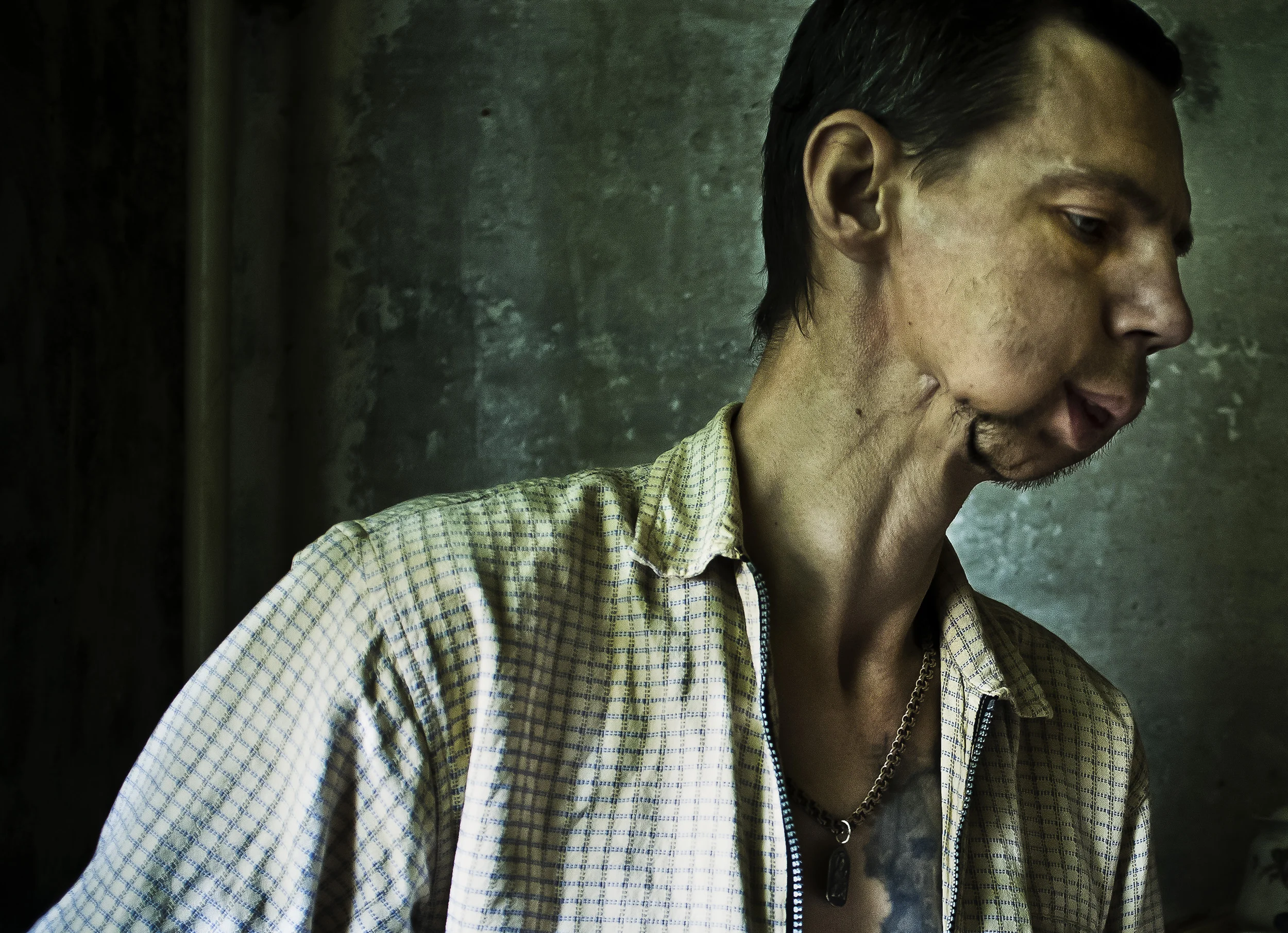

DONETSK, UKRAINE - AUGUST 16 2005: Tatjana, 42, is a former drug addict who started taking drugs at age 32. She became HIV+ in 1996 and quit. She has two children, a daughter of 23 and son of 16. She has been on anti retro virals for a year but they are having an adverse effect on her. She cannot walk properly, hear properly and feels the whole time that something inside her is pushing her, driving her, so she spend most of her time walking around her tiny apartment. She cannot talk properly and cries constantly. Tatjana's mother Olga, 72, takes care of her and her 16 year old son. This is something she does more out of a sense of duty than love and that weighs heavily on Tatjana and makes for a loveless atmosphere in the apartment. Tatjana's mother also stated, "They should shoot all drug users. I don't understand why the government should spend money on them." thus illustrating her lack of understanding of the far reaching implications of HIV for families and communities. This lack of understanding is commonplace in Ukraine and is the norm. HIV + people are often treated as criminals rather than victims. (Photo by Brent Stirton/Getty Images) *** Local Caption *** AIDS

POLTAVA, UKRAINE - AUGUST 12 2005: Tanya, 29, is a sex-worker and drug user who is HIV+. She has an eleven year old son and lives with 5 other sex workers in a small apartment in a poor neighbourhood. She used to weigh 100 kilograms but has wasted away to nothing. She has severe septicemia on her legs and a rampant addiction. Tanya tells that sometimes in the past wealthy men would seek her out for sex as part of a bizarre "Russian roulette with Aids" scenario, where they would have unprotected sex and dice with the odds of contracting HIV. (Photo by Brent Stirton/Getty Images) *** Local Caption *** AIDS

POLTAVA, UKRAINE - AUGUST 12 2005: Lena, 28, a sex worker and drug addict helps Tanya, 28, also a sex worker, to inject into her diseased leg, the easiest place for them to find a vein. Both girls are HIV+ and live in the apartment with 4 other sex workers who are all addicts. (Photo by Brent Stirton/Getty Images) *** Local Caption *** AIDS

POLTAVA, UKRAINE - AUGUST 12 2005: Tanya, 29, is a sex-worker and drug user who is HIV+. She has is pictured with her eleven year old son Vitali. He does not go to school and spends his days playing computer games and dreaming about Africa where he says he will enjoy doing nothing. When asked if he knows his mother is an addict he say "Yes but I don't want to talk about that." They live with 5 other sex workers in a small apartment in a poor neighbourhood. Tanya used to weigh 100 kilograms but has wasted away to nothing. She has severe septicemia on her legs and a rampant addiction. Tanya tells that sometimes in the past wealthy men would seek her out for sex as part of a bizarre "Russian roulette with Aids" scenario, where they would have unprotected sex and dice with the odds of contracting HIV. (Photo by Brent Stirton/Getty Images) *** Local Caption *** AIDS

POLTAVA, UKRAINE - AUGUST 12 2005: In a small apartment in a poor neighbourhood of Poltava, two brothers shoot up drugs while their mother looks on helpless in her own home. Alla, left, is the mother of Dima, 39, middle, and Ruslan, 36, right. They have been addicts for over 20 years and in that time both sons have had daughters. Alla lost her husband 15 years ago and had to quit her job as a kindergarten teacher to look after her addict sons. Ruslan, the younger son, often berates her for being a bad mother as a means of controlling her and ensuring that she will continue to look after him and his brother. It is rumoured in the neighbourhood that the family deals in drugs so as the two brothers can maintain their addiction. (Photo by Brent Stirton/Getty Images) *** Local Caption *** AIDS

POLTAVA, UKRAINE - AUGUST 12 2005: In a small apartment in a poor neighbourhood of Poltava, one of two brothers shoot up drugs while their mother looks on helpless in her own home. Alla, left, is the mother of Dima, 39, middle, and Ruslan, 36, out of frame. They have been addicts for over 20 years and in that time both sons have had daughters. Alla lost her husband 15 years ago and had to quit her job as a kindergarten teacher to look after her addict sons. Ruslan, the younger son, often berates her for being a bad mother as a means of controlling her and ensuring that she will continue to look after him and his brother. It is rumoured in the neighbourhood that the family deals in drugs so as the two brothers can maintain their addiction. (Photo by Brent Stirton/Getty Images) *** Local Caption *** AIDS

KHARKOV, UKRAINE, AUGUST 2011: Addicts cook up an Ephedrine based Amphetamine cocktail in a small apartment in a housing project in Kharkov, Ukraine, 28 August 2011. (Photo by Brent Stirton/Reportage for Getty Images.)

KHARKOV, UKRAINE, AUGUST 2011: Addicts cook up an Ephedrine based Amphetamine cocktail in a small apartment in a housing project in Kharkov, Ukraine, 28 August 2011. (Photo by Brent Stirton/Reportage for Getty Images.)
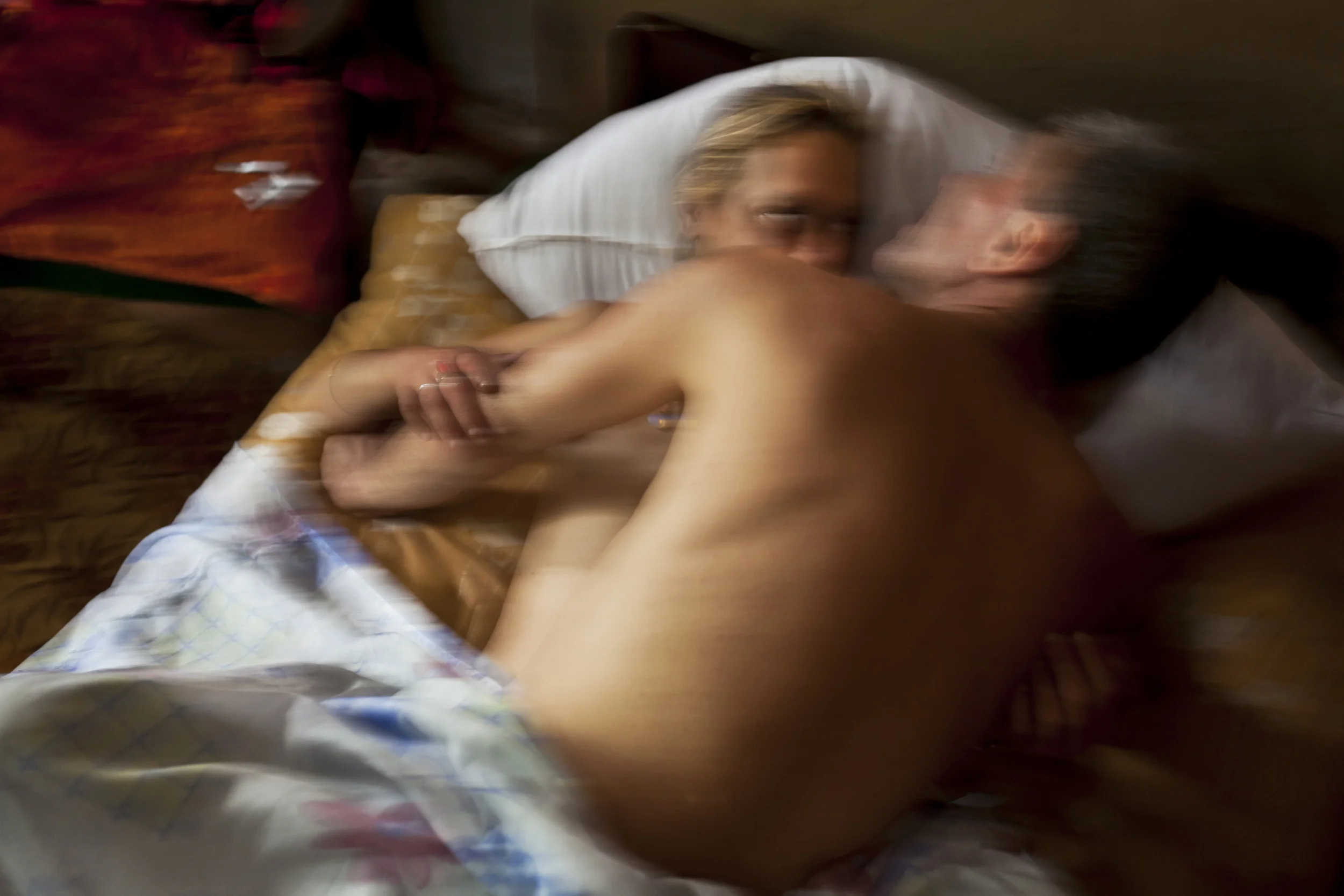
KRYVYI RIG, UKRAINE, AUGUST 2011: Maria, a drug addict and sex worker, entertains a client in a room she rents in a house from an old lady, Kryvyi Rig, Ukraine, 28 August 2011. Maria uses drugs on a daily basis and sees many men every week but remains HIV negative. She claims she need the money to support herself, her habit and her 9 year old daughter. (Photo by Brent Stirton/Reportage for Getty Images.)

KRYVYI RIG, UKRAINE, AUGUST 2011: Maria, a drug addict and sex worker, entertains a client in a room she rents in a house from an old lady, Kryvyi Rig, Ukraine, 28 August 2011. Maria uses drugs on a daily basis and sees many men every week but remains HIV negative. She claims she need the money to support herself, her habit and her 9 year old daughter. (Photo by Brent Stirton/Reportage for Getty Images.)

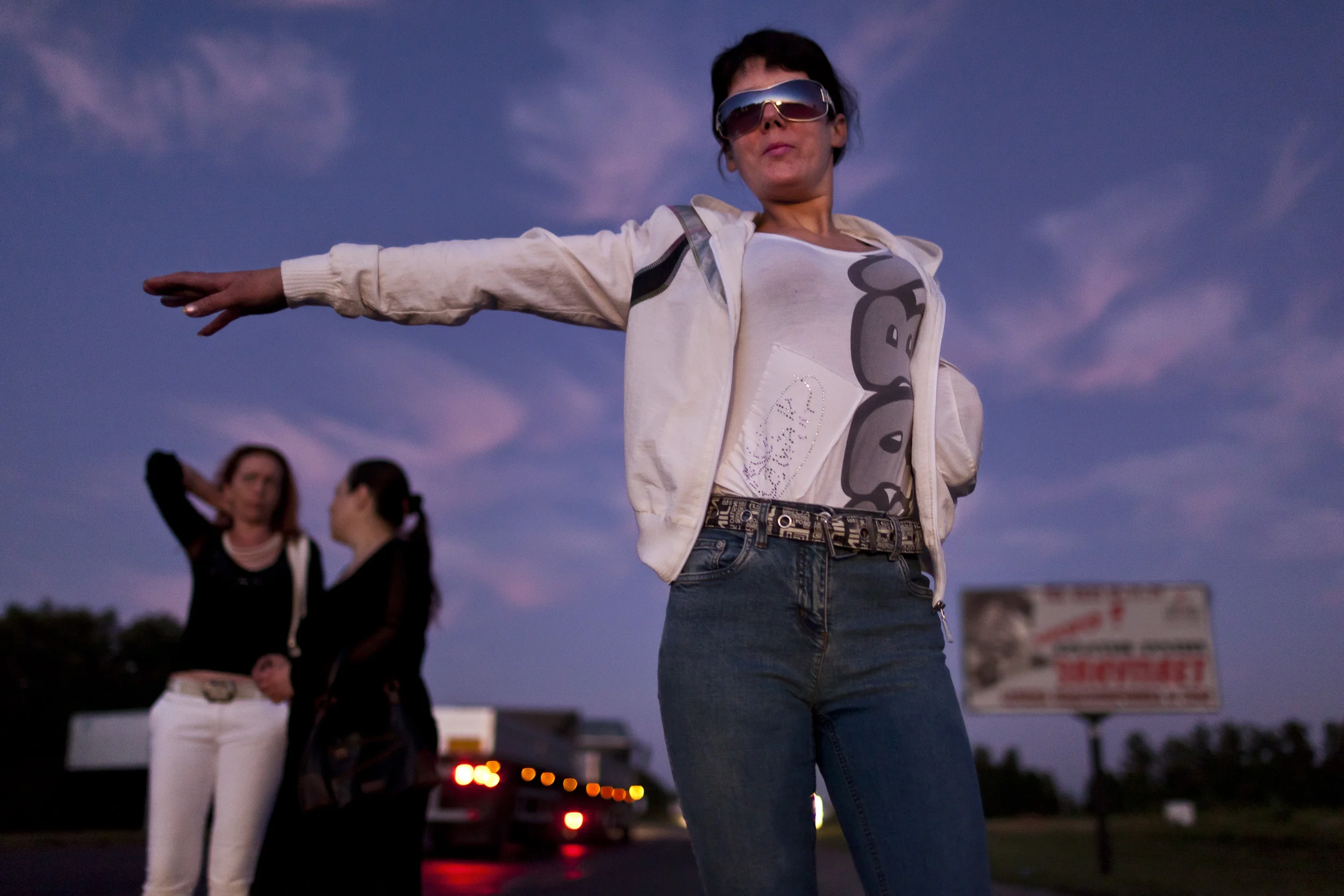

POLTAVA, UKRAINE - AUGUST 12 2005: A roadside sex worker who is a drug addict services a client in scrub just off the main road leading in and out of Poltava. These girls see between one and five clients a night, for an average of $8 a time. Many of these girls move from town to town across the country with truckers, spreading the HIV virus as they go. (Photo by Brent Stirton/Getty Images) *** Local Caption *** AIDS
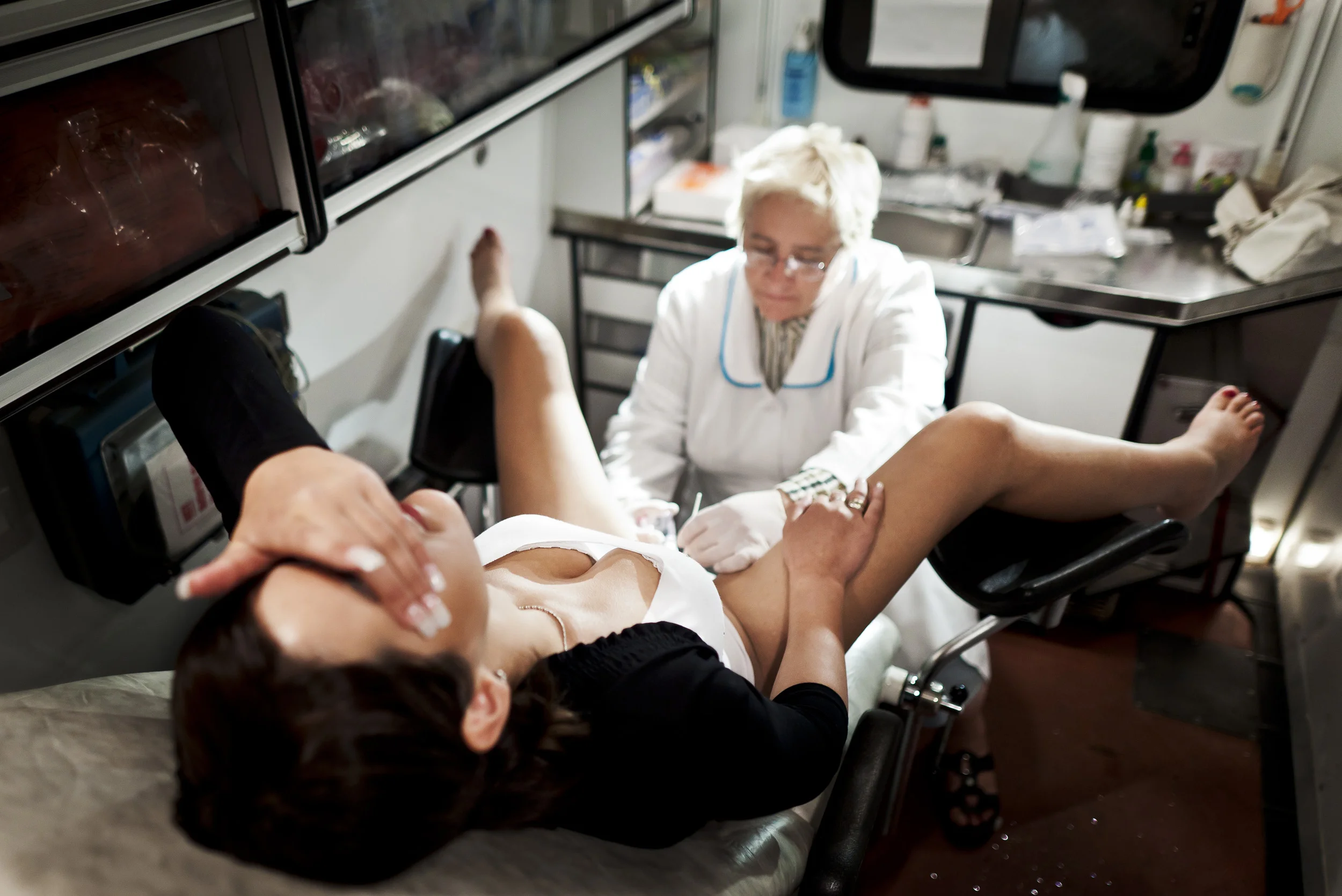
ODESSA, UKRAINE, SEPTEMBER 2011: Images of a gynacological examination in the vehicle of local Ngo "Faith, Hope, Love" which works with Sex-workers in Odessa, Ukraine 4 September 2011. The Ngo has a vehicle with a gynacologist, two social workers and a driver which moves around the city 4 nights a week doing rapid testing for HIV, handing out condoms and referals, counselling and also performing gynacological services for sex-workers. (Photo by Brent Stirton/Reportage by Getty Images.)


POLTAVA, UKRAINE, AUGUST 2011: An addict prepares to treat his grossly septic feet in a filthy apartment in Poltava while his mother, 80, looks on, Ukraine, 26 August 2011. They both deal out of the apartment and feel they have little economic alternative. He has been using drugs for over 30 years. (Photo by Brent Stirton/Reportage by Getty Images.)

KRYVYI RIG, UKRAINE, AUGUST 2011: HIV + drug addict Sacha bathes his mother every day in their small apartment in Kryvyi Rig, Ukraine, 31 August 2011. He takes care of her, washing her clothes, feeding her and makes sure she is cared for. Sacha is worried as he moves into full blown Aids that there will be no-one to look after his elderly mother. The reason his case is so worriesome is because there have been no new admissions allowed to the list of Anti Retro-Viral therapy recipients for those people living with full blown Aids in Ukraine since the end of 2010. Sacha is not on that list and is inelegible for treatment as a result. Nine months later in September 2011 all those people who have become critically ill but are not on the old list of ART recipients are living under a death sentence as their immune systems collapse. There is a new Government in Ukraine and the Ministry of Health controls all ART (Anti-RetroViral treatment,) medicine. As this business is put out to tender to the various pharmaceutical companies, a series of ignorances, bribes and corrupt practises hinder this vital service from coming into being in time to provide life-saving ART therapy to those who are dying without it. (Photo by Brent Stirton/Reportage for Getty Images.)

KIEV, UKRAINE, AUGUST 2011: A Christian Ukrainian counselling group made up of ex addicts prays in a stairwell at their office in Kiev, Ukraine, 24 August 2011. (Photo by Brent Stirton/Reportage by Getty Images.)
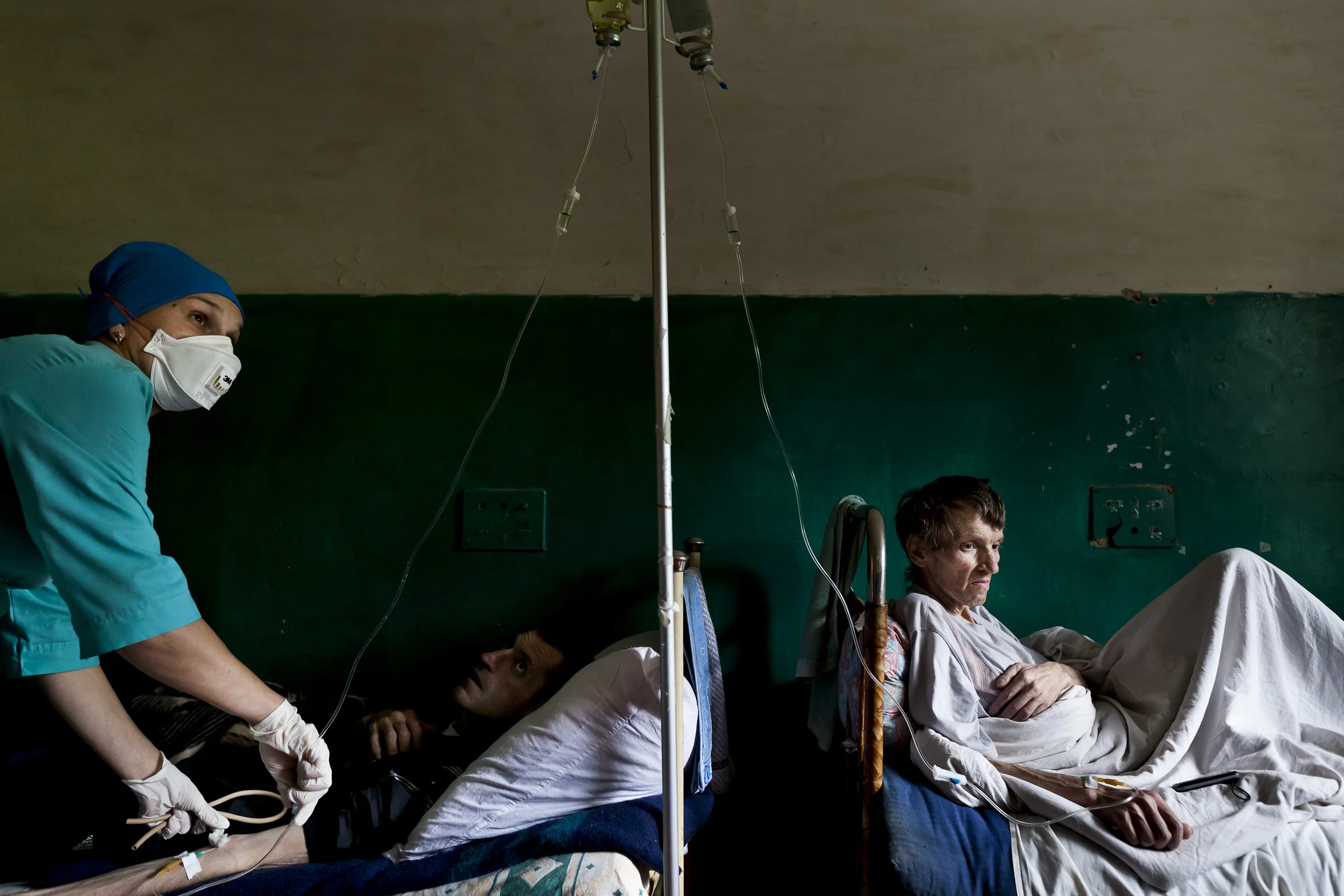
KIEV, UKRAINE, SEPTEMBER 2011: Scenes from the Tuberculosis Hospital in Kiev, Ukraine, 7 September 2011. Staff work under difficult conditions, with many patients who are drug addicts and criminals. There are also severe shortages in terms of funding for new equipment and security for the staff. Staff in the hospital have been attacked by patients, police are afraid of the disease these patients carry and have not acted to protect the nurses and doctors who risk their lives daily in the care of these patients. (Photo by Brent Stirton/Reportage by Getty Images.)
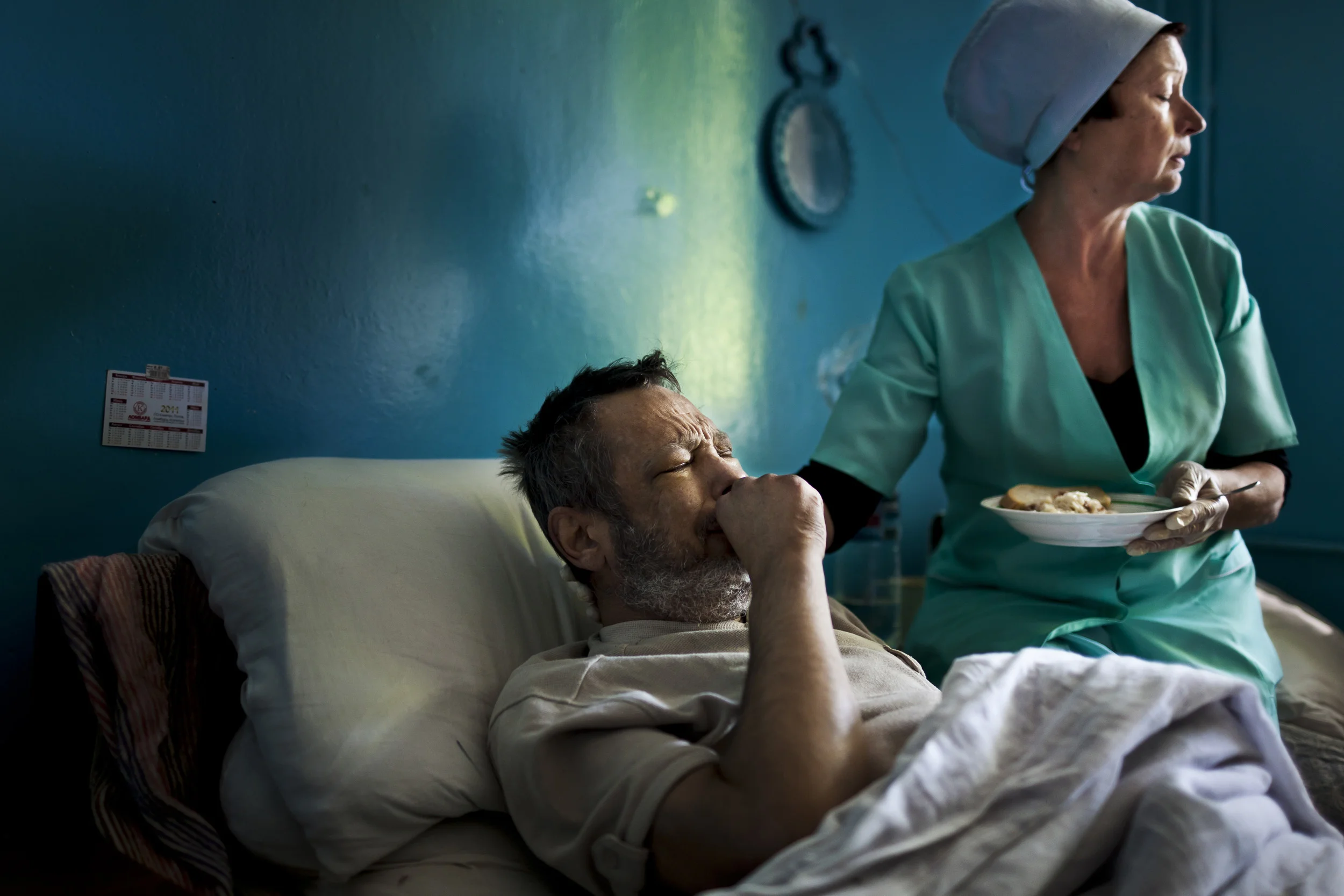
POLTAVA, UKRAINE, AUGUST 2011: Scenes inside Poltava Tuberculosis clinic, a facility with insufficent resources which is the only facility for Tuberculosis patients in Poltava, Ukraine, 26 August 2011. (Photo by Brent Stirton/Reportage by Getty Images.)
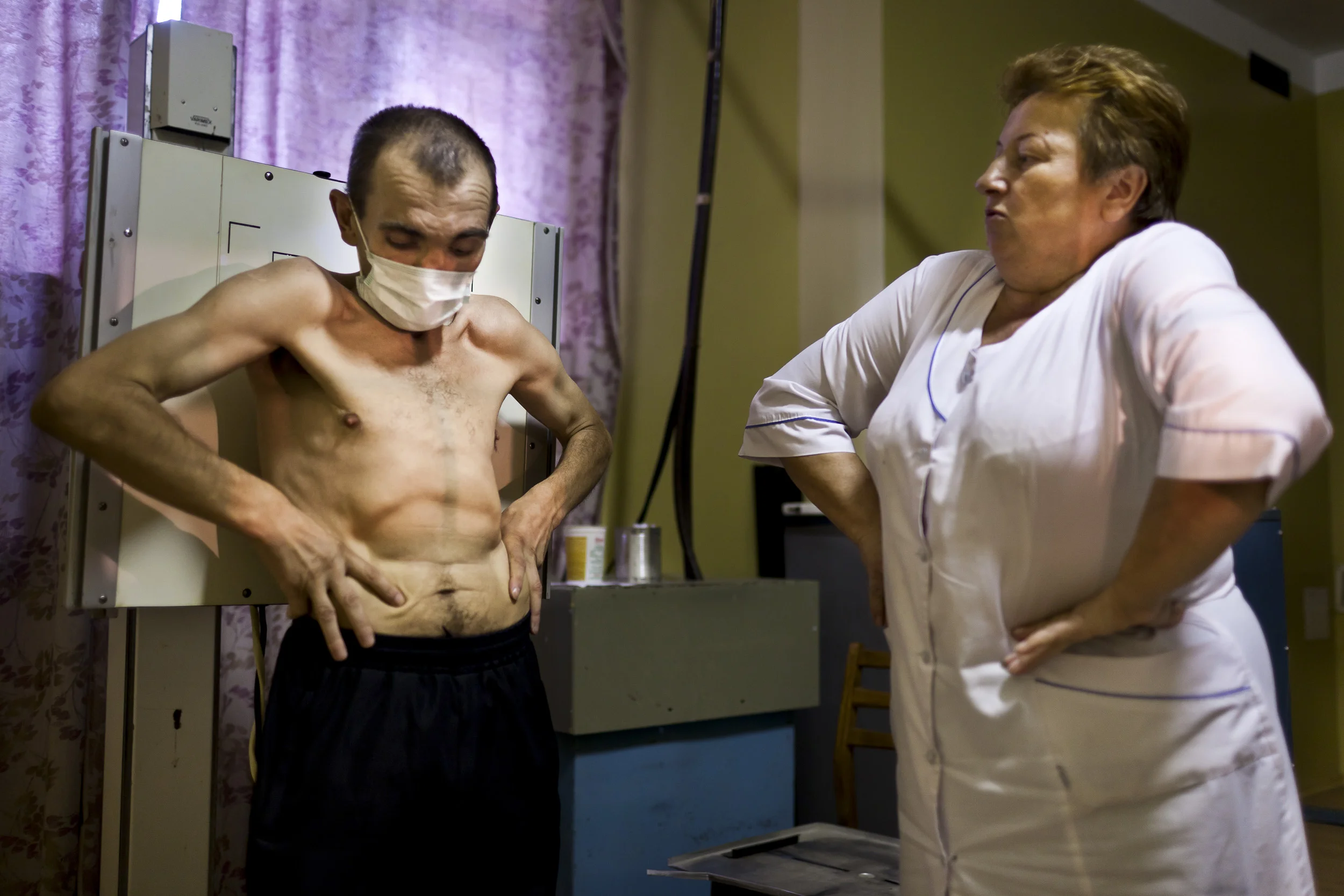
KIEV, UKRAINE, SEPTEMBER 2011: Scenes from the Tuberculosis Hospital in Kiev, Ukraine, 7 September 2011. Staff work under difficult conditions, with many patients who are drug addicts and criminals. There are also severe shortages in terms of funding for new equipment and security for the staff. Staff in the hospital have been attacked by patients, police are afraid of the disease these patients carry and have not acted to protect the nurses and doctors who risk their lives daily in the care of these patients. (Photo by Brent Stirton/Reportage by Getty Images.)

KIEV, UKRAINE, SEPTEMBER 2011: Scenes from the Tuberculosis Hospital in Kiev, Ukraine, 7 September 2011. Staff work under difficult conditions, with many patients who are drug addicts and criminals. There are also severe shortages in terms of funding for new equipment and security for the staff. Staff in the hospital have been attacked by patients, police are afraid of the disease these patients carry and have not acted to protect the nurses and doctors who risk their lives daily in the care of these patients. (Photo by Brent Stirton/Reportage by Getty Images.)

POLTAVA, UKRAINE - AUGUST 15 2005: Andrey, 28, waits to be X-rayed at the local TB hospital. He is HIV+ and has advanced TB. They are often linked in Ukraine. Andrey received a five year prison sentence for drug possesion but his parents were able to pay a $300 bribe to officials and have him sent to the hospital instead. It is likely that he will be jailed again. (Photo by Brent Stirton/Getty Images) *** Local Caption *** AIDS

POLTAVA, UKRAINE, AUGUST 2011: Scenes inside Poltava Tuberculosis clinic, a facility with insufficent resources which is the only facility for Tuberculosis patients in Poltava, Ukraine, 26 August 2011. (Photo by Brent Stirton/Reportage by Getty Images.)

KIEV, UKRAINE, AUGUST 2011: A prisoner n the last stages of full-blown Aids who has been rushed to the Kiev Aids Center from prison receives compassionate care from a doctor while chained to the bed, The Kiev Aids Center in Kiev, Ukraine, 25 August 2011. This facility is one of two in Ukriane and deals with many drug addicts and other difficult Aids infected people. There are strict rules and conditions in the wards which staff claim are neccesary to protect them from aggressive, manic patients. (Photo by Brent Stirton/Reportage by Getty Images.)
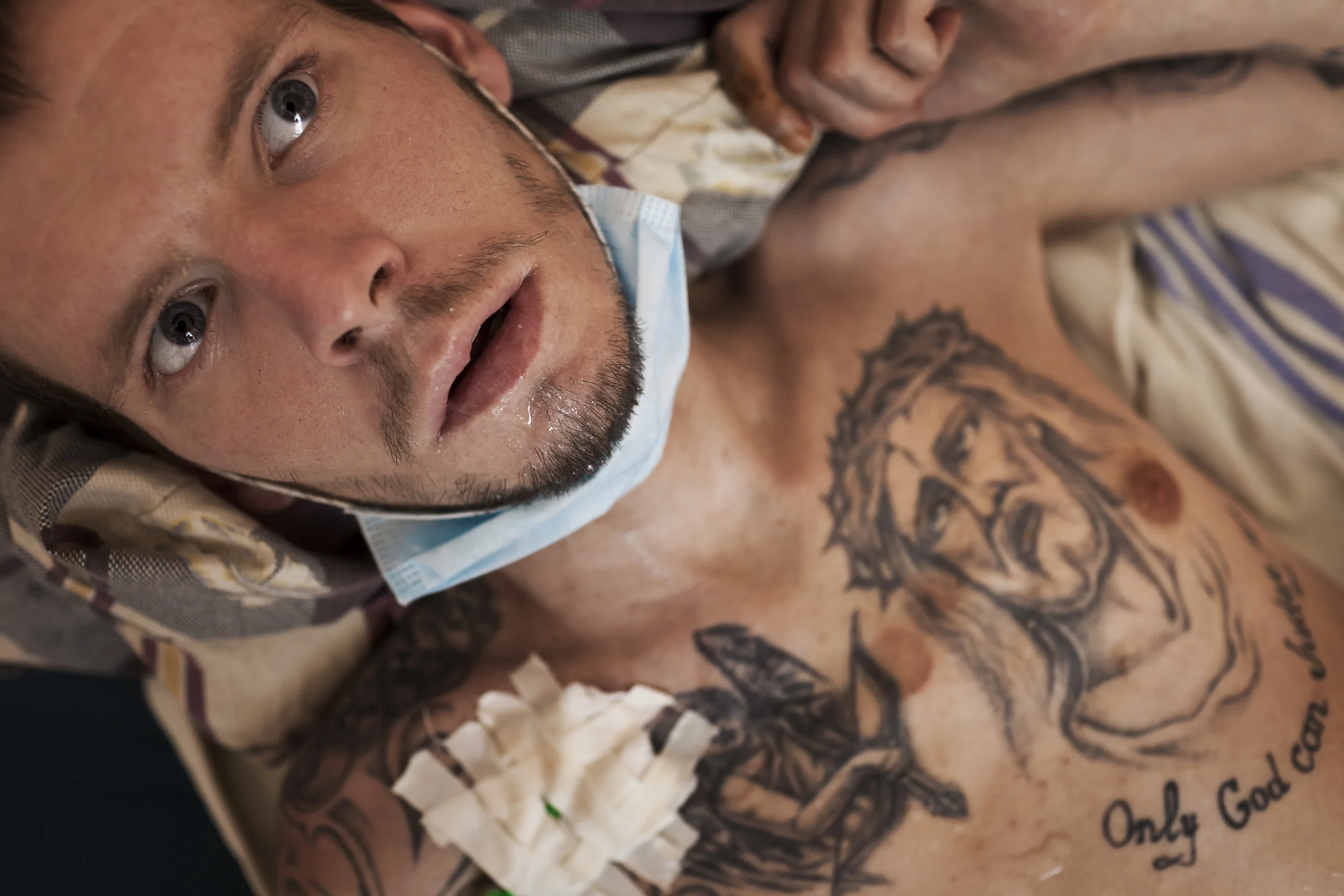
KIEV, UKRAINE, AUGUST 2011: A prisoner n the last stages of full-blown Aids who has been rushed to the Kiev Aids Center from prison receives compassionate care from a doctor while chained to the bed, The Kiev Aids Center in Kiev, Ukraine, 25 August 2011. This facility is one of two in Ukriane and deals with many drug addicts and other difficult Aids infected people. There are strict rules and conditions in the wards which staff claim are neccesary to protect them from aggressive, manic patients. (Photo by Brent Stirton/Reportage by Getty Images.)
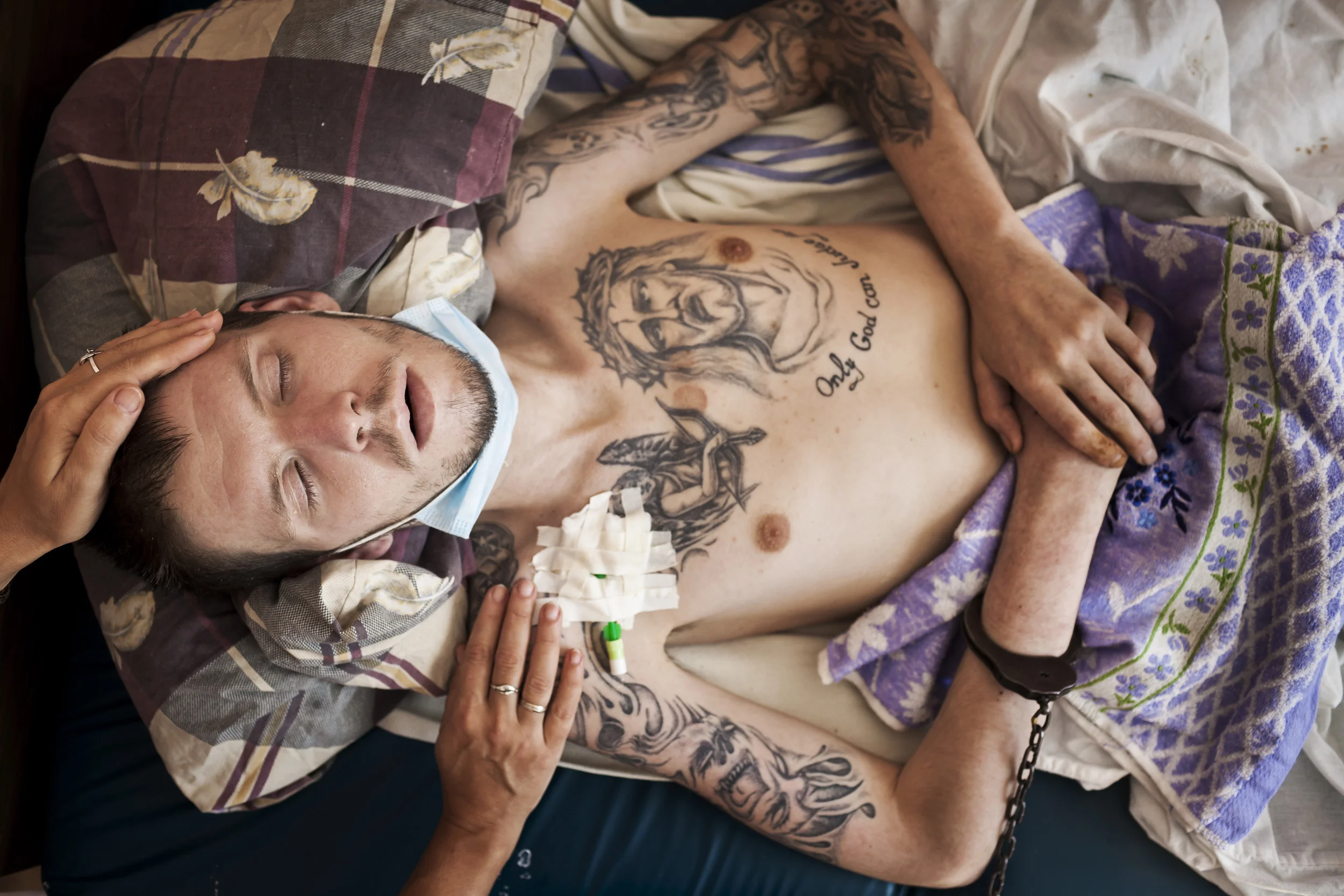
KIEV, UKRAINE, AUGUST 2011: A prisoner n the last stages of full-blown Aids who has been rushed to the Kiev Aids Center from prison receives compassionate care from a doctor while chained to the bed, The Kiev Aids Center in Kiev, Ukraine, 25 August 2011. This facility is one of two in Ukriane and deals with many drug addicts and other difficult Aids infected people. There are strict rules and conditions in the wards which staff claim are neccesary to protect them from aggressive, manic patients. (Photo by Brent Stirton/Reportage by Getty Images.)
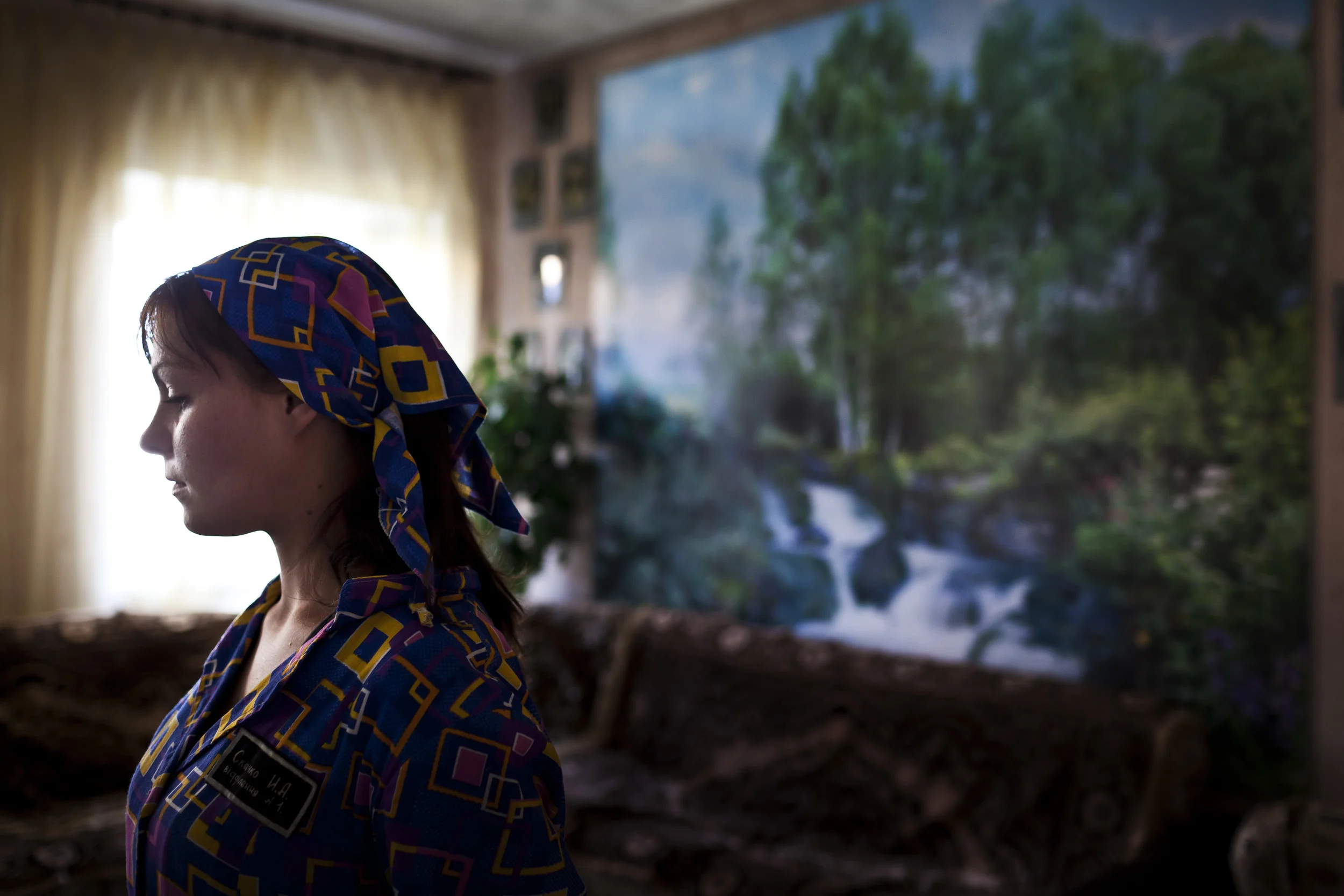


KRYVYI RIG, UKRAINE, AUGUST 2011: Addicts undergo sleep therapy during the drug detox program at Psycho Neurological Dispensary, Kryvyi Rig, Ukraine, 31 August 2011. This program has good success in getting patients back to a pysiological level where they can receive counselling for their addictions. (photo by Brent Stirton/Reportage by Getty Images.)
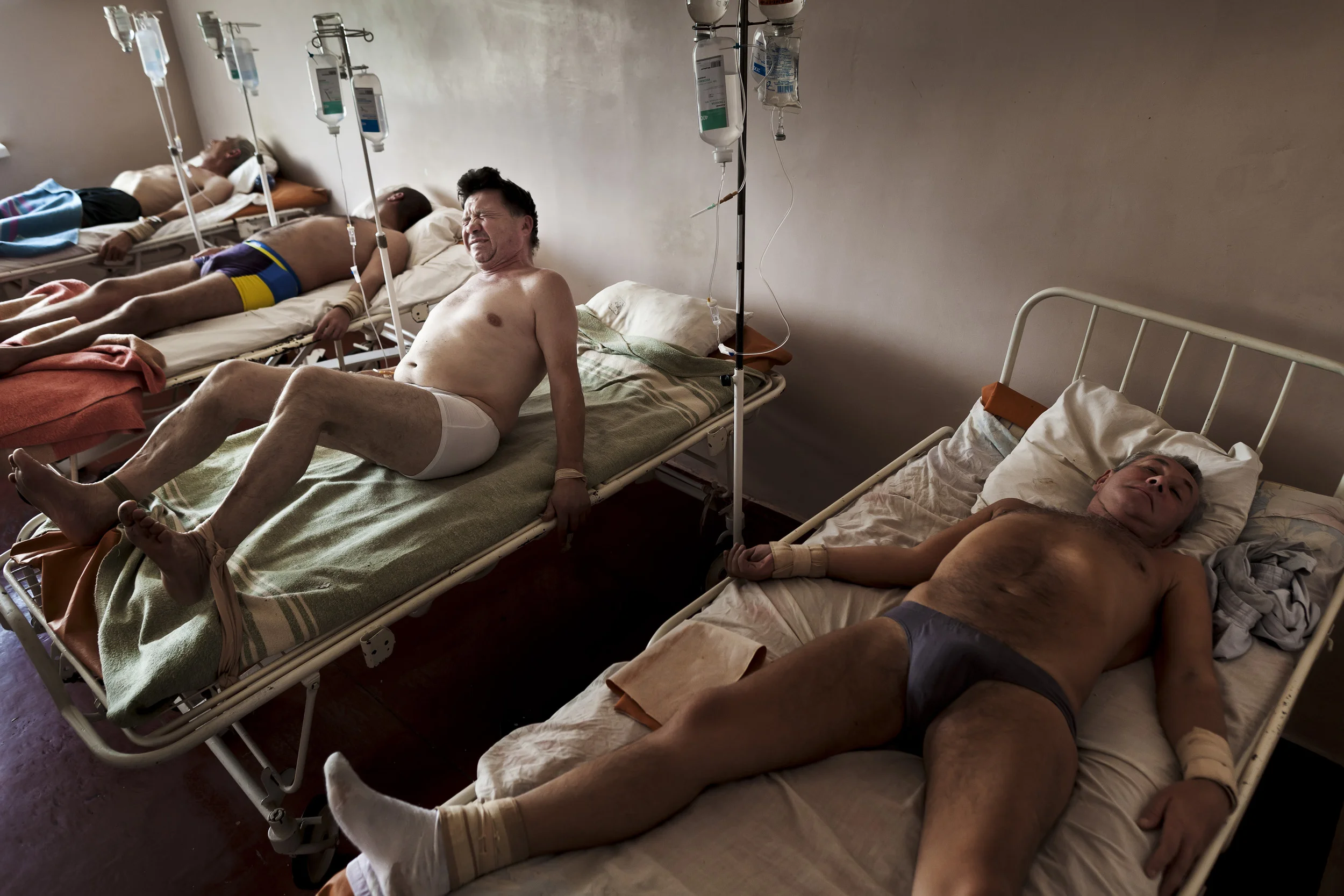
KRYVYI RIG, UKRAINE, AUGUST 2011: Addicts undergo sleep therapy during the drug detox program at Psycho Neurological Dispensary, Kryvyi Rig, Ukraine, 31 August 2011. This program has good success in getting patients back to a pysiological level where they can receive counselling for their addictions. (photo by Brent Stirton/Reportage by Getty Images.)

DNEPROPETROVSK, UKRAINE, AUGUST 2011: A former Surgical doctor, Olga, conducts mobile rapid testing for the Aids virus in housing projects amongst drug users, Dnepropetrovsk, Ukraine, 30 August 2011. Olga came to work in these communities because she was unknowingly infected with HIV by a surgical patient in late 2000 when she was 26. Her hospital found out at the regular 6 month testing required by surgical doctors. Olga was then asked to resign by the Chief Medical officer and when she refused was subjected to humiliating and multiple pressures at work. She was finally forced to resign after 4 months of unrelenting pressure and active rumor mongering amongst hospital staff that she had been working as a prostitute and violating her privacy by telling other about her HIV status. She spent the next two years locked away in her apartment, not daring to tell anyone and being a total recluse. Since then she has embraced her HIV + status and uses her medical training to care for disadvantaged HIV+ people in her town. (Photo by Brent Stirton/Reportage by Getty Images.)

DNEPROPETROVSK, UKRAINE, AUGUST 2011: A former Surgical doctor, Olga, conducts mobile rapid testing for the Aids virus in housing projects amongst drug users, Dnepropetrovsk, Ukraine, 30 August 2011. Olga came to work in these communities because she was unknowingly infected with HIV by a surgical patient in late 2000 when she was 26. Her hospital found out at the regular 6 month testing required by surgical doctors. Olga was then asked to resign by the Chief Medical officer and when she refused was subjected to humiliating and multiple pressures at work. She was finally forced to resign after 4 months of unrelenting pressure and active rumor mongering amongst hospital staff that she had been working as a prostitute and violating her privacy by telling other about her HIV status. She spent the next two years locked away in her apartment, not daring to tell anyone and being a total recluse. Since then she has embraced her HIV + status and uses her medical training to care for disadvantaged HIV+ people in her town. (Photo by Brent Stirton/Reportage by Getty Images.)
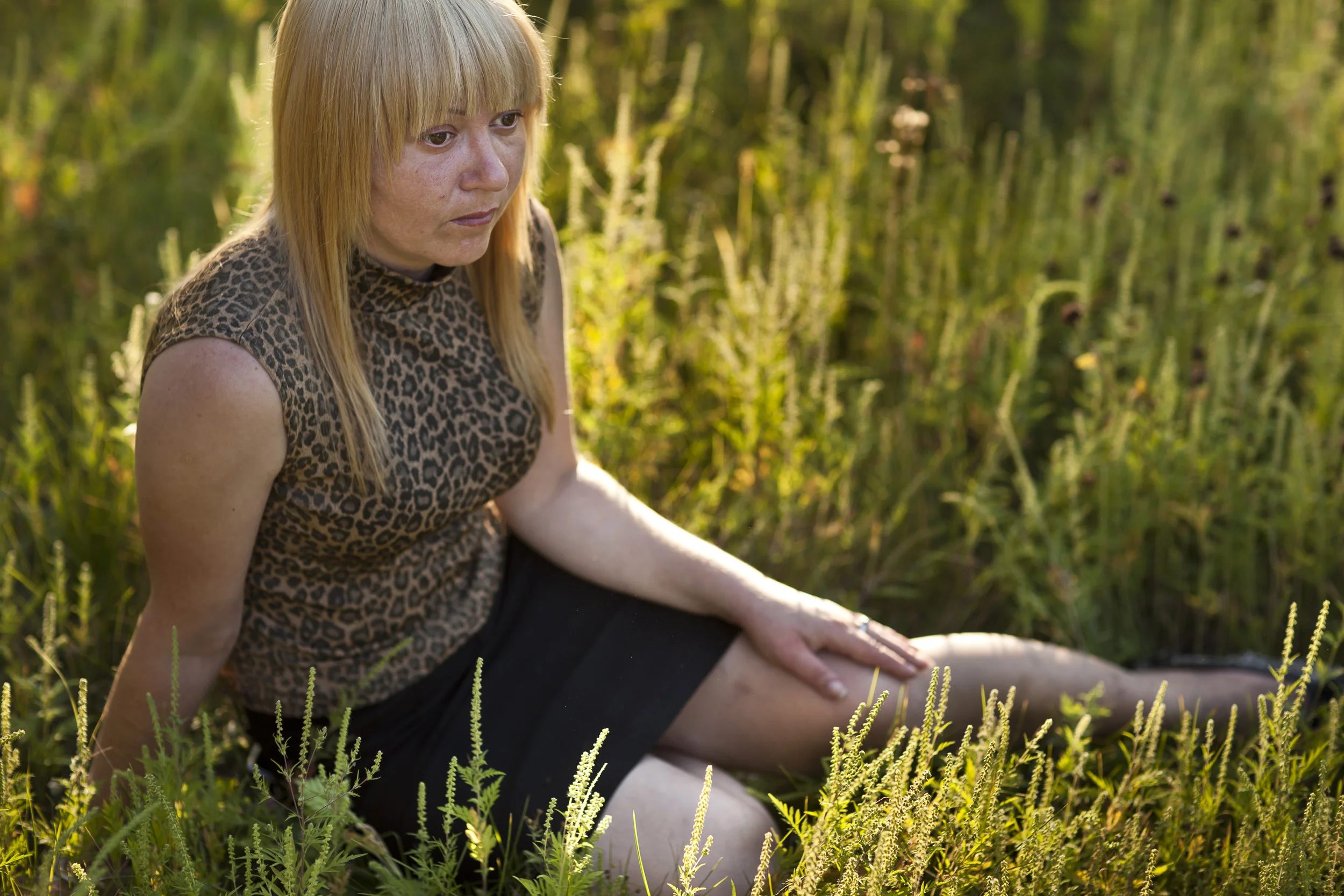
KHARKOV, UKRAINE, AUGUST 2011: Tamara is an HIV+ drug addict on the run from the police, Kharkov, Ukraine, 28 August 2011. She has no access to identity documents because she is on the run and as a result cannot access medical treatment, CT4 counts and Anti-retroviral medication. She is on the run because she stole to support her addiction. (Photo by Brent Stirton/Reportage for Getty Images.)
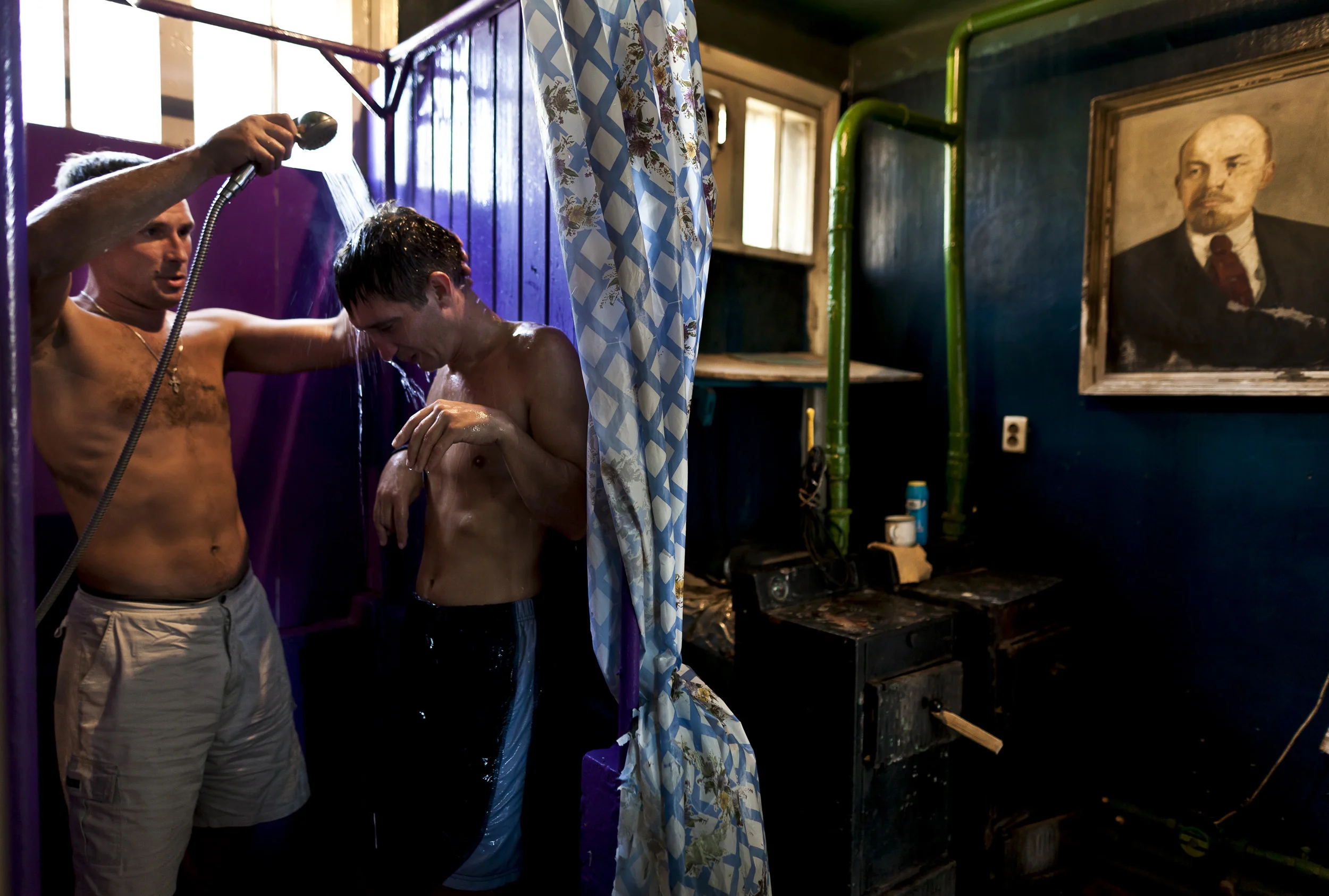
KHARKOV, UKRAINE, AUGUST 2011: Sergei helps his partially paralysed friend Volver to shower at a rehabilitation centre in Kharkov, Ukraine, 29 August 2011. Volver was paralysed when he used a drug made up of Ephedrine and other chemicals which permanently damaged his nervous system. Sergei and other members of this recovering addict community help Volver to get through each day with acts of kindness that bind them together like brothers. This unselfish daily activity gives lie to the fact that addicts and also HIV+ people in Ukraine are often seen as unworthy people undeserving of compassion. (Photo by Brent Stirton/Reportage for Getty Images.)

POLTAVA, UKRAINE, AUGUST 2011: Sergei, a veteran former addict who now actively counsels and supports people trying to get off drugs in Poltava, Ukraine, 26 August 2011. Sergei went on a Methadone substitution program to get off heroin and then quit Methadone to live drug free. He is the first addict in Poltava to have made this very difficult and painful step. (Photo by Brent Stirton/Reportage by Getty Images.)
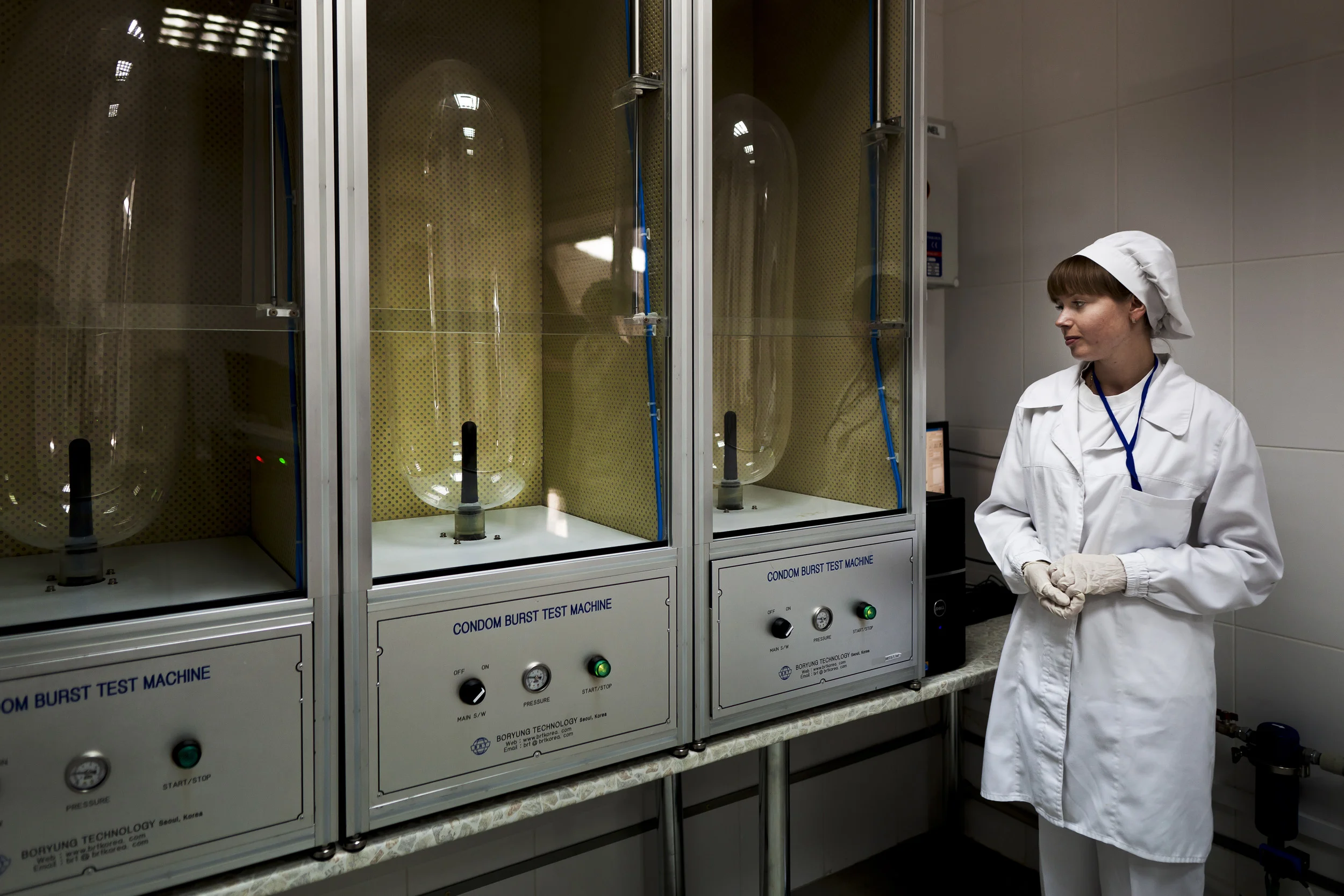
DNEPROPETROVSK, UKRAINE, AUGUST 2011: Images from Ukraines' only Condom manufacturing plant, Dnepropetrovsk, Ukraine, 30 August 2011. (Photo by Brent Stirton/Reportage by Getty Images.)

DNEPROPETROVSK, UKRAINE, AUGUST 2011: Images from Ukraines' only Condom manufacturing plant, Dnepropetrovsk, Ukraine, 30 August 2011. (Photo by Brent Stirton/Reportage by Getty Images.)
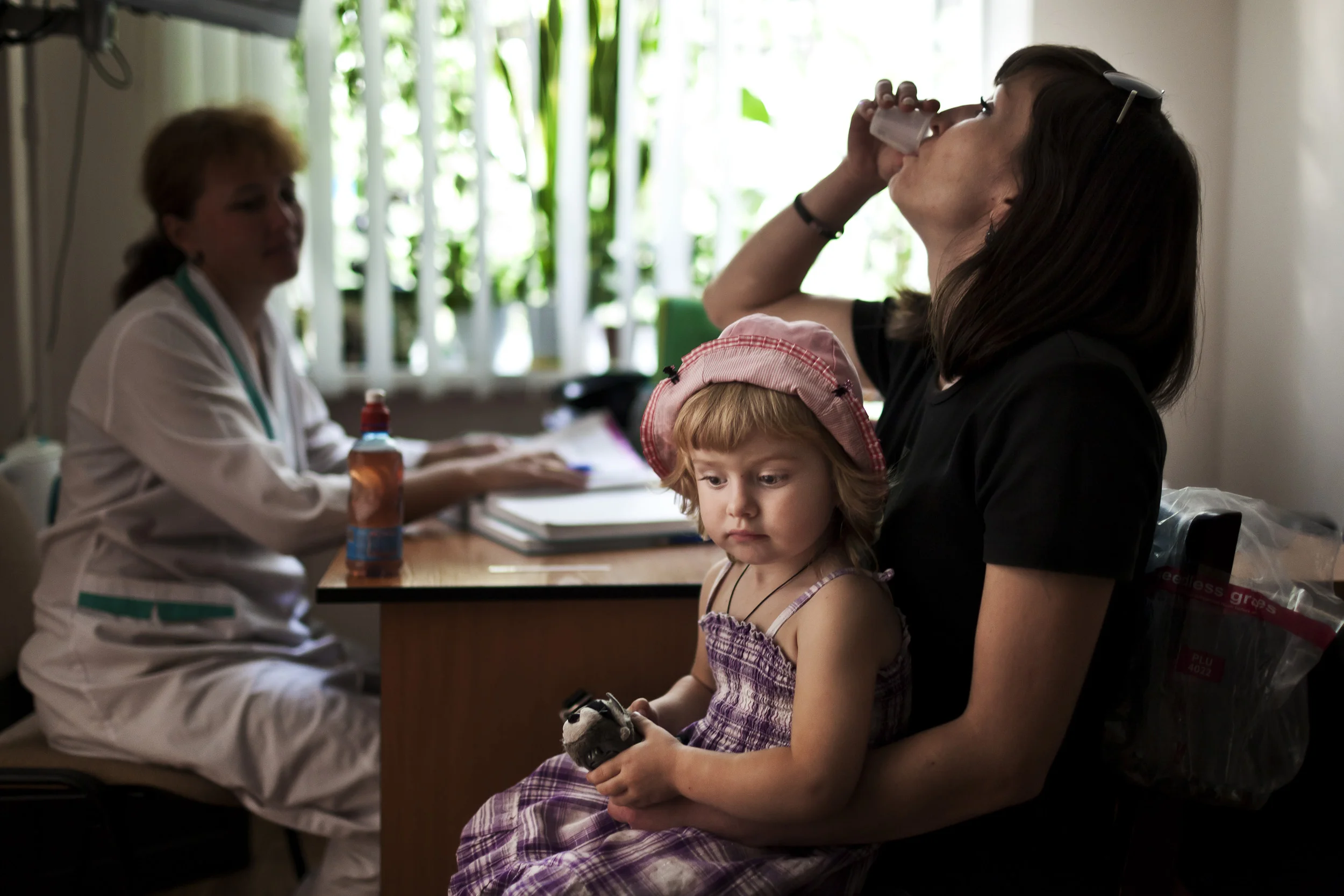
KIEV, UKRAINE, AUGUST 2011: An HIV+ mother swallows her Methadone dosage at a drug substitution program using Methadone to substitute for Heroin at the Kiev Aids Center in Kiev, Ukraine, 25 August 2011. This program has been treated with suspicion by the Authorities and the hospital has been raided a few times by over-zealous authorities who do not condone the program despite its world wide success rate. (Photo by Brent Stirton/Reportage by Getty Images.)

DONETSK, UKRAINE, SEPTEMBER 2011: Alina, a 10 year old HIV+ girl is examined by doctors at a mobile unit which moves between small cities dealing with HIV+ children who would not otherwise have access to treatment, Donetsk, Ukraine, 1 September 2011. Alina is the daughter of HIV+ drug addicts, her T cell count is checked as is her weight and growth, she also receives 3 months ART therapy medication from the doctors of this mobile unit. Alina is extraordinarily independent, she spends most of her time with her great grandmother and essentially raises herself, she consults with the doctors on how her body is coping with the disease and she understands what is happening to her completely. She cooks, cleans and plans for herself and does well at school and is very independent and well mannered, especially for someone who comes from her social circumstances. A person to be hugely admired and loved. (Photo by Brent Stirton/Reportage by Getty Images.)
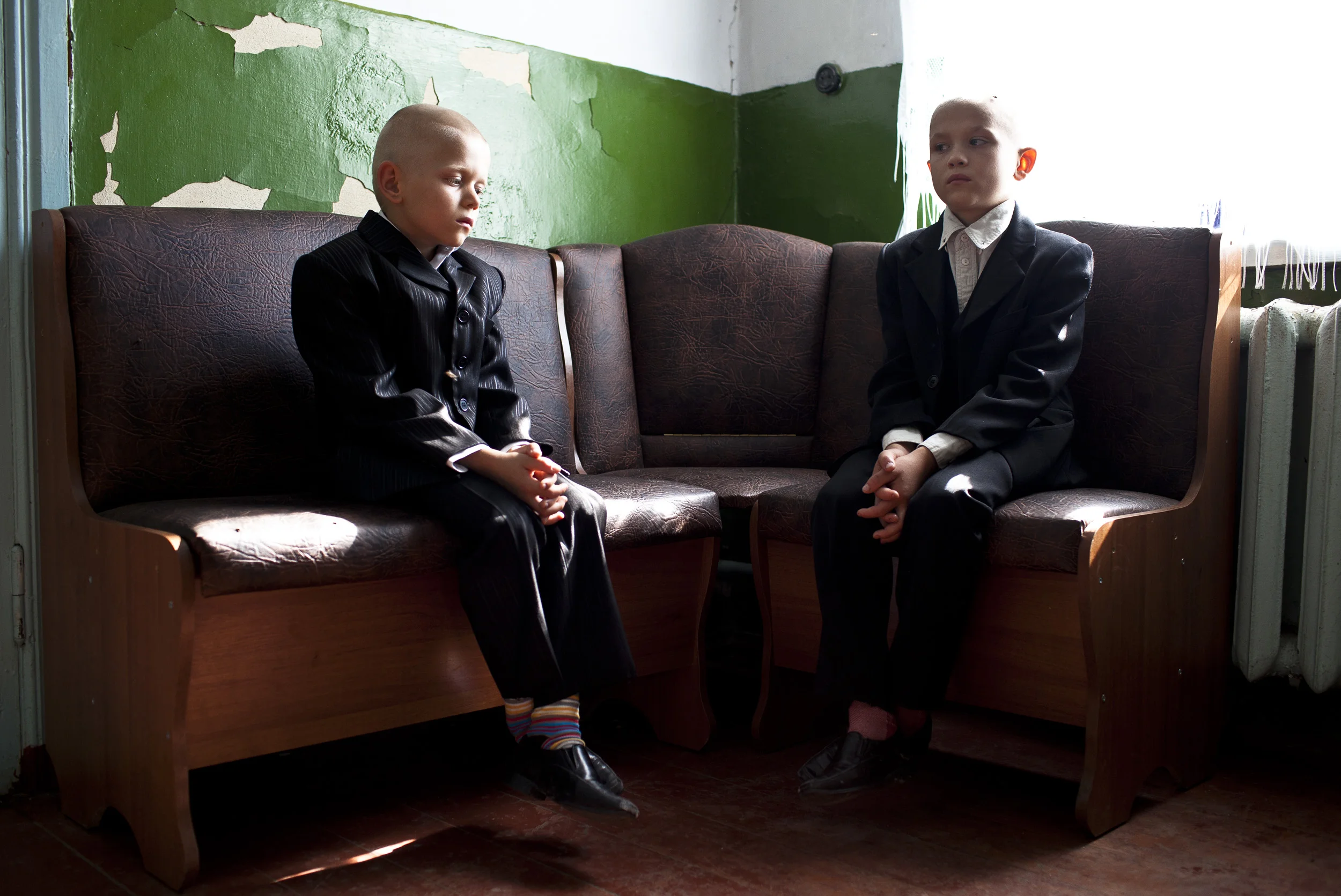
DONETSK, UKRAINE, SEPTEMBER 2011: A young Aids affected child in the home of his HIV+ drug addicted mother in their poverty stricken village on the first day of school, Donetsk, Ukraine, 1 September 2011. (Photo by Brent Stirton/Reportage by Getty Images.)
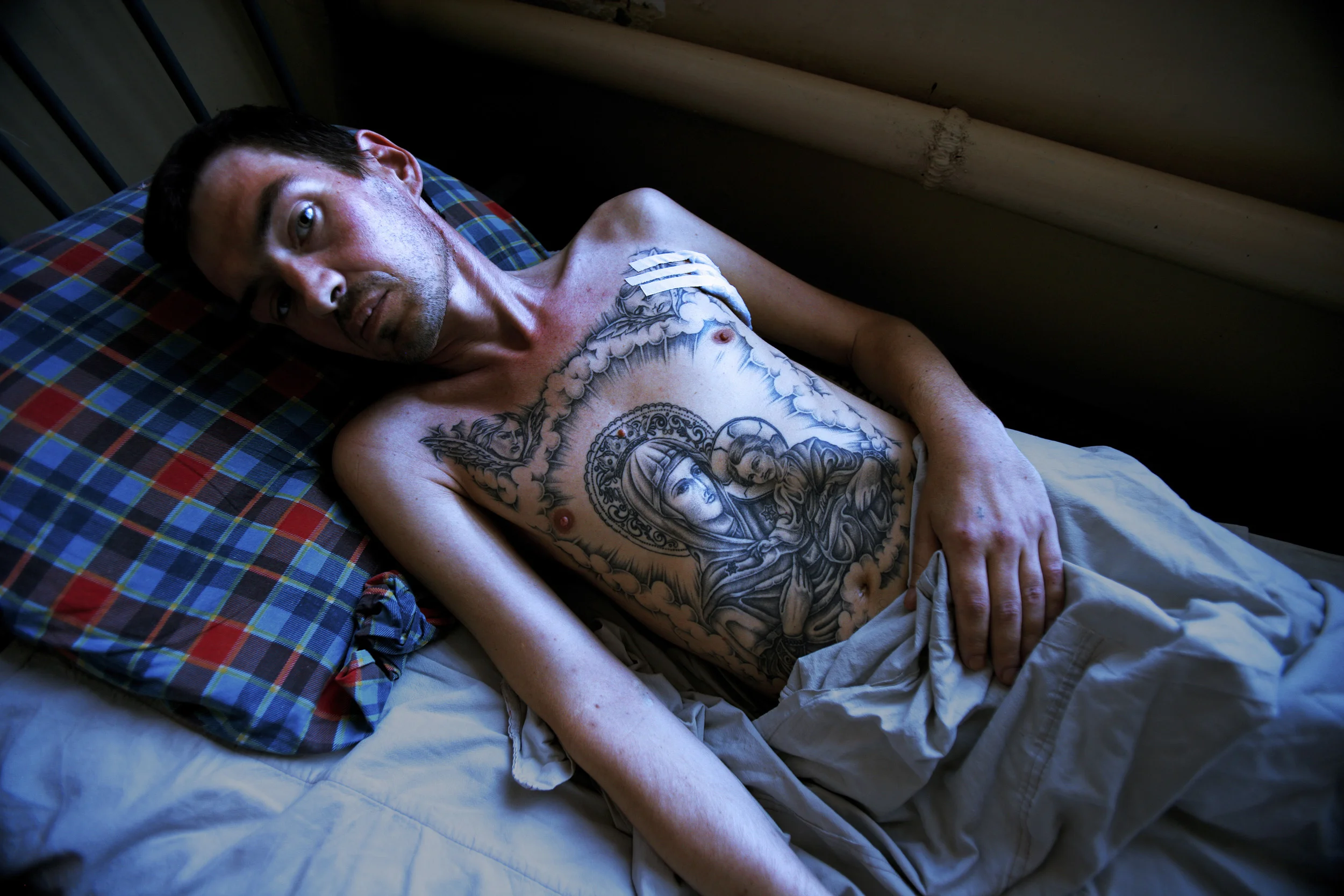
KHERSON, UKRAINE - AUGUST 18 2005: A prisoner with full blown Aids lies in an intensive care ward at Kherson Prison Hospital for prisoners with HIV/Aids. Kherson Prison is the only Prison in Ukraine where HIV + prisoners are treated. There are no programmes in place for funding for Anti Retro Viral treatments for prisoners. The prisoners know they are dieing and that treatment is not available to them. The prison hospital has recently used small government funding to attempt to modernise but cannot go further due to lack of funds. No testing equipment is available and all tests have to go to Odessa for results. In the last year the number of HIV + prisoners passing through this hospital has tripled. For most prisoners ignorance adds to the stigma of Aids and it is difficult to gain a true idea of HIV statistics behind bars in Ukraine. (Photo by Brent Stirton/Getty Images) *** Local Caption *** AIDS

KHERSON, UKRAINE - AUGUST 18 2005: Prisoners with full blown Aids lie in an intensive care ward at Kherson Prison Hospital for prisoners with HIV/Aids. Kherson Prison is the only Prison in Ukraine where HIV + prisoners are treated. There are no programmes in place for funding for Anti Retro Viral treatments for prisoners. The prisoners know they are dieing and that treatment is not available to them. The prison hospital has recently used small government funding to attempt to modernise but cannot go further due to lack of funds. No testing equipment is available and all tests have to go to Odessa for results. In the last year the number of HIV + prisoners passing through this hospital has tripled. For most prisoners ignorance adds to the stigma of Aids and it is difficult to gain a true idea of HIV statistics behind bars in Ukraine. (Photo by Brent Stirton/Getty Images) *** Local Caption *** AIDS

POLTAVA, UKRAINE - AUGUST 15 2005: A patient sits alone in the entertainment room of the Aids wing of Poltava Psychiatric Hospital. There is no facility for HIV+ people at any hospital in Poltava. If they require treatment they are forced to come and live in the Psychiatric hospital. The man depicted has been living there for 3 years and has no friends and only a cat for company. (Photo by Brent Stirton/Getty Images) *** Local Caption *** AIDS
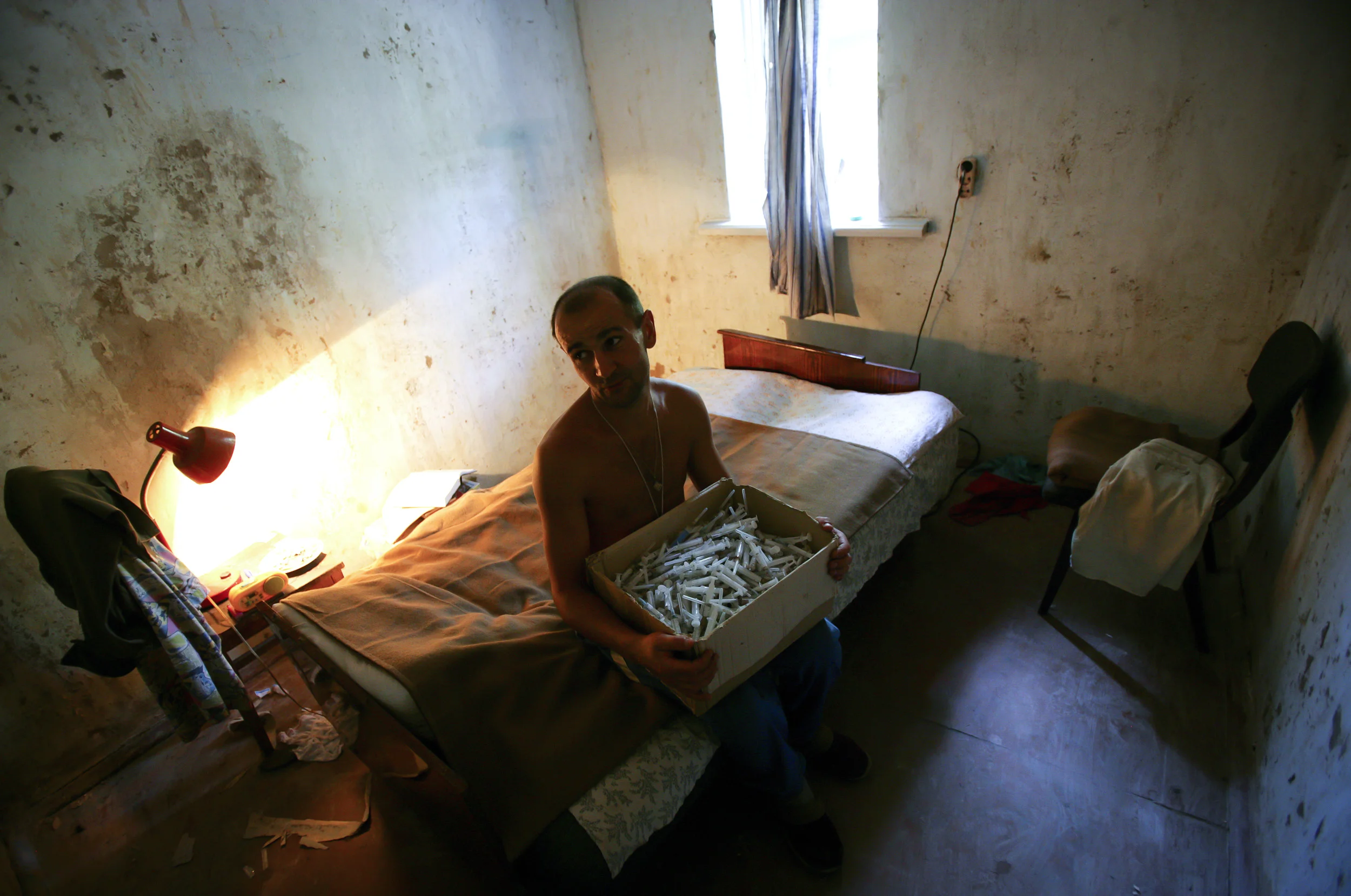
DONETSK, UKRAINE - AUGUST 16 2005: Sacha, 33, was a drug addict for 12 years before he found relegion. He believes that God found him and saved him from himself. He continues to deal drugs but he now collects needles for needle exchange programmes in Donetsk. He gives those clean needles out to the addicts who frequent his house, a perfect fromula for needle exchange. When he was using drugs he almost destroyed the home he is sitting in. Now he is trying to rebuild it. (Photo by Brent Stirton/Getty Images) *** Local Caption *** AIDS

ODESSA, UKRAINE - AUGUST 21 2005: A group of streetkids sleeping in a damp, filthy underground cellar in Odessa. All of the 6 kids in the cellar are HIV+ and many have signs of advanced Tuberculosis. When they were told of their HIV+ status the kids reportedly said, "Kill us, give us an injection and let us die now." Local NGO "The Way Home" tries to visit these kids on a regular basis and takes them food, condoms and clean needles. It is estimated that there are over 5000 of these streetkids in Odessa. They speak no common moral language as a result of their experiences on the street and form their own criminal underclass in Ukraine. They are often used by older criminals as thieves as they are difficult to prosecute as minors. The girls are often forced to act as prostitutes and are extremely vulneralbe to rape, pregnancy at a young age and sexually transmitted disease. The fact that many of them are HIV+ and drug users only adds to their desperation and fearlessness. Neglecting the streetkid/HIV issue means a growing future problem for authorities in Ukraine. (Photo by Brent Stirton/Getty Images) *** Local Caption *** AIDS

DONETSK, UKRAINE, SEPTEMBER 2011: A young Aids affected child in the home of his HIV+ drug addicted mother in their poverty stricken village on the first day of school, Donetsk, Ukraine, 1 September 2011. (Photo by Brent Stirton/Reportage by Getty Images.)
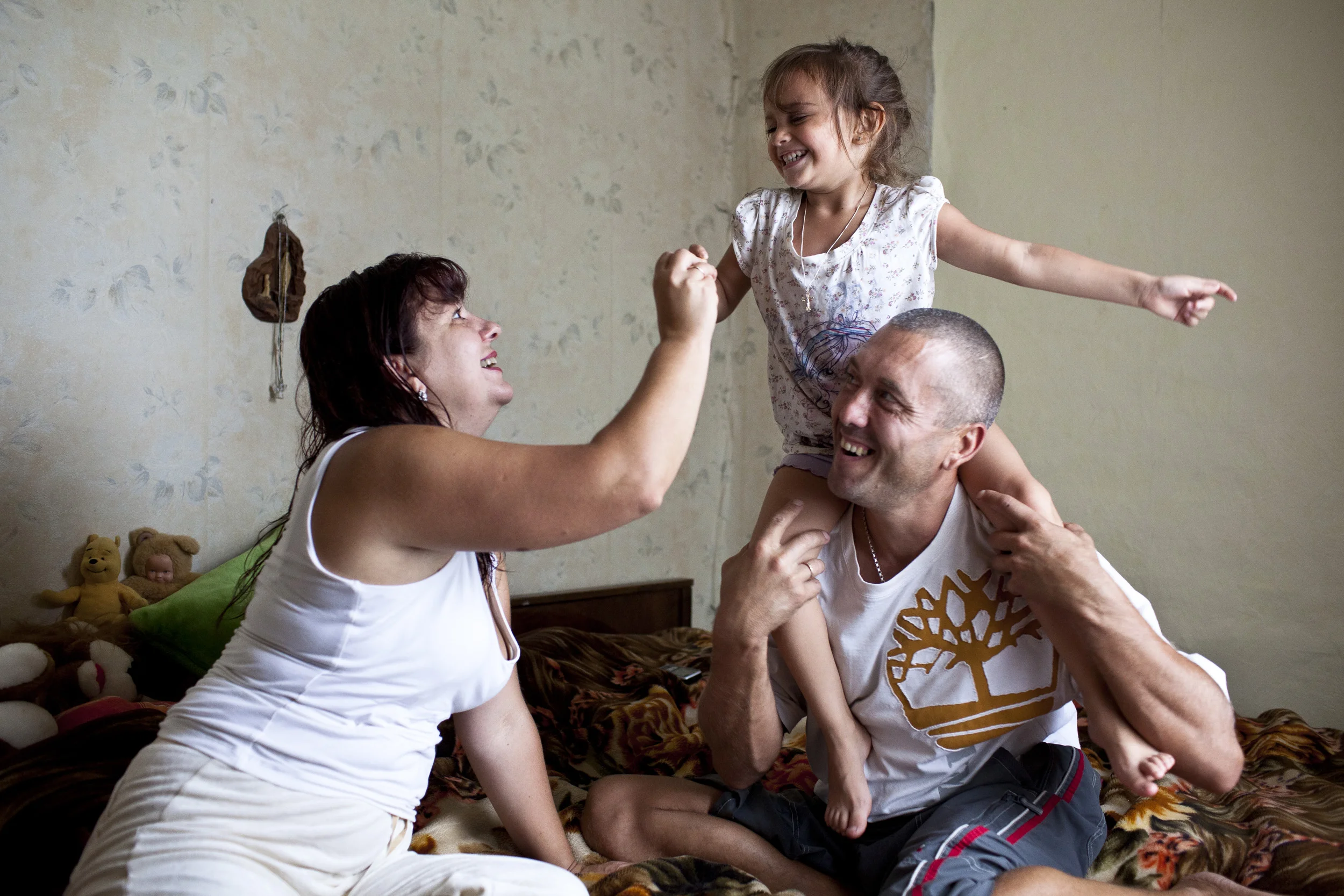
DONETSK, UKRAINE, SEPTEMBER 2011: A HIV+ man and his HIV negative wife and her adopted daughter in their home in Donetsk, Ukraine, 1 September 2011. He met her when he came for treatment for his Tuberculosis at a clinic where she worked as a doctor and they have been together ever since. (Photo by Brent Stirton/Reportage by Getty Images.)

KHARKOV, UKRAINE, AUGUST 2011: In addition to normally orphaned children, Orphanage Zeleniy Gai in Kharkov, Ukraine is a home to HIV + children, Aids affected children as well as children removed from homes where parents were either too addicted to care for them or too remiss as a result of their addictions, August 28 2011. This orphanage is one of the few in Ukraine to make children living with HIV a priority. There are special excercise programs, therapy using animals and special new born units all designed to care for these children. (Photo by Brent Stirton/Reportage for Getty Images.)

KHARKOV, UKRAINE, AUGUST 2011: In addition to normally orphaned children, Orphanage Zeleniy Gai in Kharkov, Ukraine is a home to HIV + children, Aids affected children as well as children removed from homes where parents were either too addicted to care for them or too remiss as a result of their addictions, August 28 2011. This orphanage is one of the few in Ukraine to make children living with HIV a priority. There are special excercise programs, therapy using animals and special new born units all designed to care for these children. (Photo by Brent Stirton/Reportage for Getty Images.)

UKRAINE, SEPTEMBER 2011: Banchensky Svyato - Voznesensky Monastry Orphanage is an orphanage founded by the Russian Orthodox Church in Ukraine which takes exceptional care of 253 kids, Ukraine, 6 September 2011. 44 of the kids at the orphanage are HIV+ and live in a special building with permanent care-givers and exceptional living conditions. The kids on ART therapy receive that daily at breakfast, the kids old enough to go to school do so at the local village school. The younger kids receive a kindergarten style education on the orphanage premises. This orphanage has been taking in HIV+kids since 2002, in marked contrast to the normally negative attitudes displayed by the church towards HIV+ people in Ukraine. (Photo by Brent Stirton/Reportage by Getty Images.)
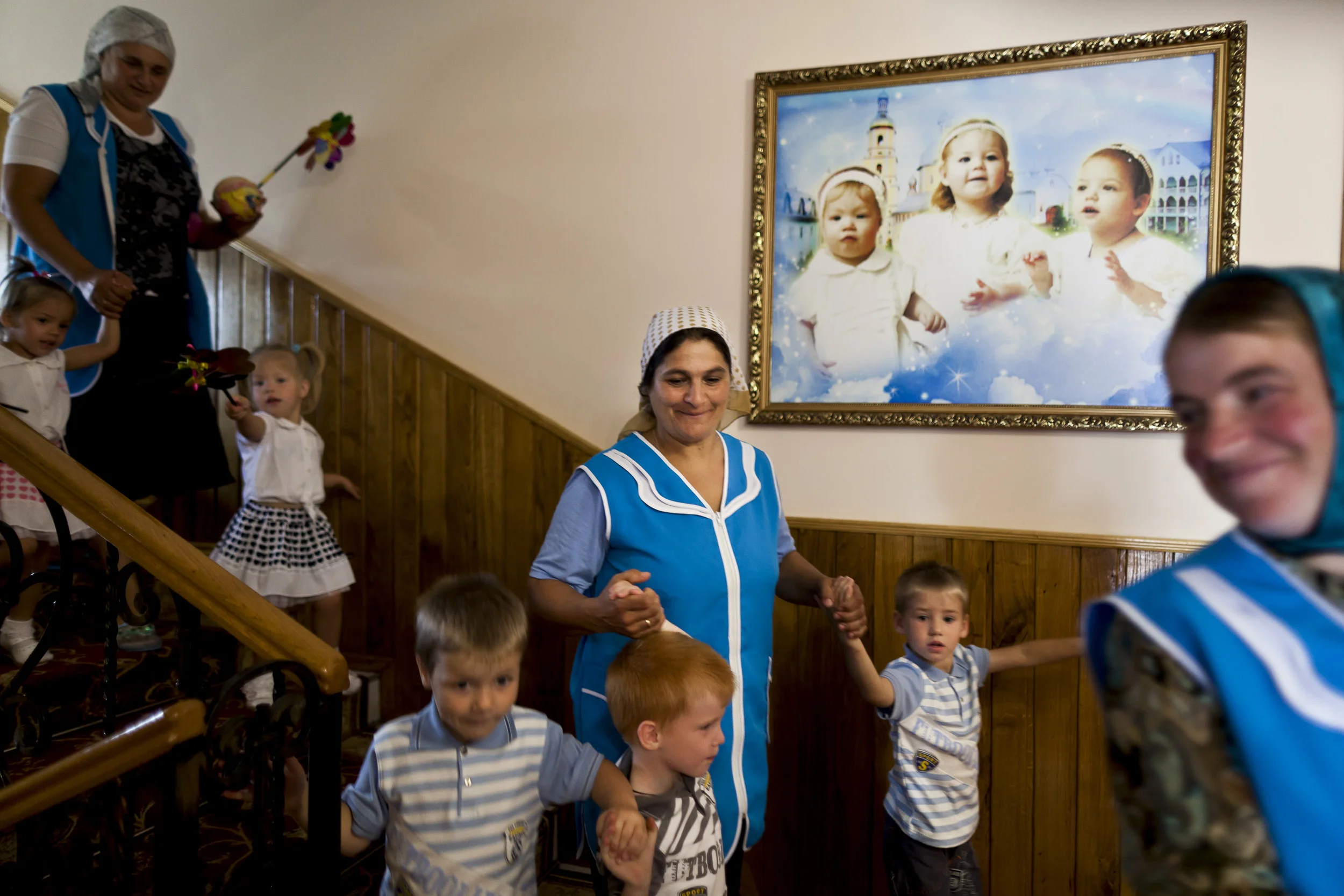

UKRAINE, SEPTEMBER 2011: Banchensky Svyato - Voznesensky Monastry Orphanage is an orphanage founded by the Russian Orthodox Church in Ukraine which takes exceptional care of 253 kids, Ukraine, 6 September 2011. 44 of the kids at the orphanage are HIV+ and live in a special building with permanent care-givers and exceptional living conditions. The kids on ART therapy receive that daily at breakfast, the kids old enough to go to school do so at the local village school. The younger kids receive a kindergarten style education on the orphanage premises. This orphanage has been taking in HIV+kids since 2002, in marked contrast to the normally negative attitudes displayed by the church towards HIV+ people in Ukraine. (Photo by Brent Stirton/Reportage by Getty Images.)

UKRAINE, SEPTEMBER 2011: Banchensky Svyato - Voznesensky Monastry Orphanage is an orphanage founded by the Russian Orthodox Church in Ukraine which takes exceptional care of 253 kids, Ukraine, 6 September 2011. 44 of the kids at the orphanage are HIV+ and live in a special building with permanent care-givers and exceptional living conditions. The kids on ART therapy receive that daily at breakfast, the kids old enough to go to school do so at the local village school. The younger kids receive a kindergarten style education on the orphanage premises. This orphanage has been taking in HIV+kids since 2002, in marked contrast to the normally negative attitudes displayed by the church towards HIV+ people in Ukraine. (Photo by Brent Stirton/Reportage by Getty Images.)

KIEV, UKRAINE - AUGUST 12 2005: Nadia is a 6 year old Aids orphan at the Kiev Orphanage Berezka. She has been living with full blown Aids for some years now and is on Anti Retro Viral treatment made possible by the Global funds involvement in the orphanage. Nadia is significantly older than the other 20 HIV+ abandoned children at the orphanage and it is looking increasingly unlikely she will be adopted. In spite of this she is a bright and independant child who is very loving to all visitors. The orphanage is home for abandoned children from age zero to 4 years. (Photo by Brent Stirton/Getty Images) *** Local Caption *** AIDS
